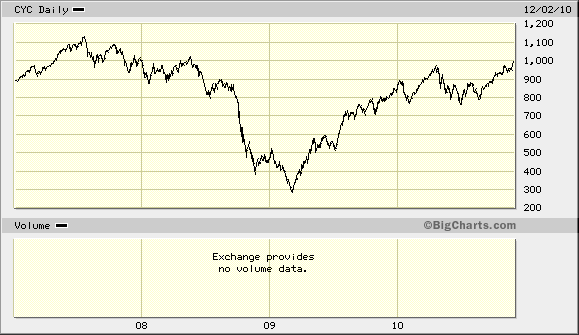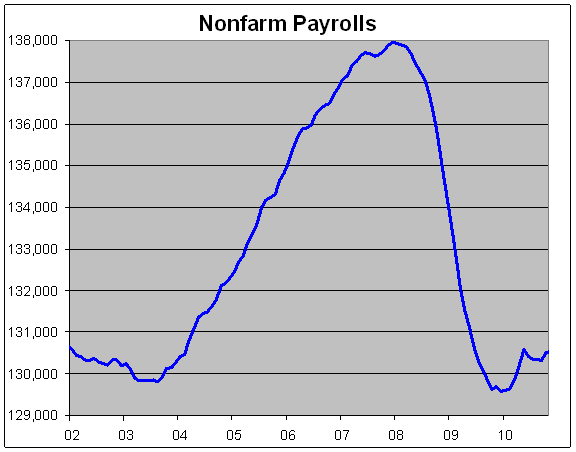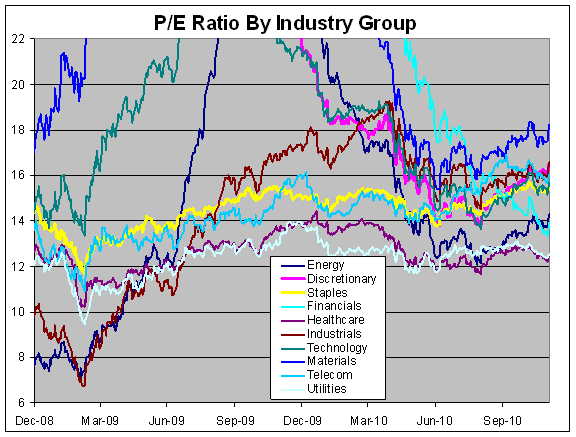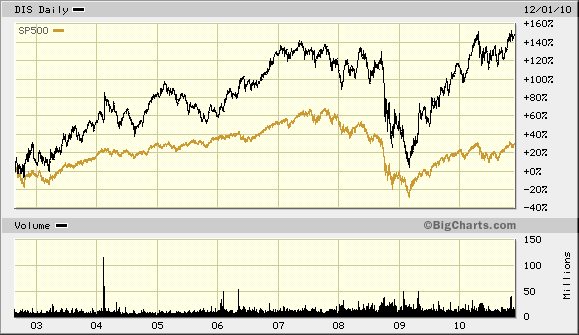Archive for December, 2010
-
The Cyclical Index Closes in on 1,000
Eddy Elfenbein, December 3rd, 2010 at 12:11 pmThe Morgan Stanley Cyclical Index (^CYC) has rallied very strongly over the past two days. It’s closing in on 1,000. The CYC hasn’t closed above 1,000 since May 20, 2008.
To give you an idea of how strongly the cyclicals have rallied, the index was at 283.04 on March 9, 2009. It’s up more than 250% in just 21 months. If the Dow had kept pace, it would be at 23,000 today.
-
The Post-Employment Economy
Eddy Elfenbein, December 3rd, 2010 at 8:37 amThe November jobs report just came out and it was terrible. The economy created just 39,000 jobs. A total of 50,000 private sector jobs were created while 11,000 government jobs were lost. The unemployment rate rose to 9.8%.
These numbers are well below expectations. The Street was expecting 150,000 new jobs and 175,000 new private sector jobs.
Private companies, which have been hiring since the beginning of the year, added 50,000 jobs in November. Most of those increases came in the form of temporary help, where 40,000 jobs were added, and in health care, with an additional 19,000 jobs.
Retail jobs declined by 28,000 in November, while manufacturing, which had showed some strength earlier in the year, lost 13,000 jobs. Government jobs dropped by 11,000 in the month.
Included in the latest report were revisions from previous months. The agency now says that the economy added 172,000 jobs in October, instead of the 151,000 jobs previously reported. September was revised to a loss of 24,000 jobs from a loss of 41,000.
Since the recession ended, the economy has lost 101,000 jobs.
-
Morning News: December 3, 2010
Eddy Elfenbein, December 3rd, 2010 at 7:30 amPeripheral Risk Premiums Fall on ECB Bond-Buying
Retail Sales Jump 6% in November
Payrolls Probably Rose in November as U.S. Economy Grew
Crude Oil Ends at 25-month High on Dollar, US Data
Shift in China’s Monetary Policy Stance Aims to Promote Sustainable Growth
Cross Section of Rich Invested With the Fed
Walter Energy Seals $3.3 Billion Western Coal Buy
Aeropostale Shares Continue Slide After 3Q Results
-
CWS Market Review – December 3, 2010
Eddy Elfenbein, December 3rd, 2010 at 7:03 amThe good news is that the stock market had very strong rallies on Wednesday and Thursday. The S&P 500 finished the day on Thursday at 1,221.53. This means it’s now within striking distance of taking out 1,225.85 which was the close on November 5th. That close was the S&P 500’s highest close since September 19, 2008 which was the Friday of the week that Lehman went bankrupt. In short, we may soon make a 26-month high.
The bad news is that the bold prediction I gave you last week for Jos. A Bank Clothiers’ ($JOSB) was terribly wrong. Let me offer my apologies. I was expecting blow-out earnings of 57 cents or more. As it turns out, JOSB only made 45 cents per share. Ugh! The consensus on the Street was for 50 cents per share.
Let’s break it down: Joe Bank’s third quarter comprises the months of August, September and October. The problem is that sales started off slowly in August. The CEO blamed the poor sales on hot weather. Eh…I’m a little skeptical, since according to my experience, August is always pretty darn hot. He also said the election was a distraction which sounds plausible. The good news is that the CEO said sales for Q4 look strong so far. In his defense, it doesn’t take a big distraction in retail to dent the bottom line.
After the earnings report was released on Wednesday, the stock plunged 6.7%. Actually, that’s better than it could have been. The stock closed slightly higher on Thursday, but it largely sat out the broad-based rally.
As disappointed as I am in JOSB, the larger picture is that this is still a well-run outfit. The company has now delivered record earnings for 36 of the last 37 quarters, including the last 18 consecutive quarters.
For them, and for many other retailers, the fourth-quarter is hugely important. For the first three quarters of this year, JOSB has made $1.61 per share. The current view on Wall Street is that they’ll make $1.42 for the fourth quarter. That estimate may get peeled back over the next few weeks since analysts got burned this time.
My view: I’m not ready to abandon JOSB. I still think it’s a good stock, but I’m lowering my buy price from $50 to $43. If you own it, you ought to stick with it.
There was other good news this week. I was impressed by the ISM number for November which came in at 56.6. Any boring number in the mid-to-high 50s is good news. This means that the economy continues to expand. Technically, any ISM reading over 50 means the economy is growing, and this was the 16th-straight month that the ISM has been greater than 50.
We also had a very strong report for the Chicago PMI, and the reported third-quarter productivity was revised higher. If all this sounds a little overly-technical, I can boil it down in a simple statement: things are getting better. Now we can truly say that there are green shoots out there.
There is, of course, one major weak spot and that’s employment. There are still 15 million Americans out of work and many more who have left the labor market. The old wisdom is that employment is a trailing indicator, meaning it picks up after other indicators have turned around. That makes sense given that a business won’t start hiring until after its business has picked up and the current staff feels strained.
This time around, the employment situation hasn’t been lagging as much as it’s been evenly timed with the economy to make things worse. Fewer jobs have meant more foreclosures which has meant more troubled banks which has meant fewer loans which has meant lower profits which has meant…fewer jobs. Rinse, repeat.
On Friday we’ll get the employment report for November. Frankly, I don’t know what to expect so I’ll hold off making any bold predictions. Wall Street expects non-farm payrolls to grow by 150,000. The NFP numbers for September and October will probably be revised as well. If the employment report is stronger-than-expected, the stock market could easily take out the November 5th high.
A strong report could also mean, and I say this very speculatively, that QE2 could be pulled back. The Fed was careful in its language to say that it was spreading out its plans over a few months. That’s the major difference between a Fed rate cut and QE2. The first is an event. The second is a process.
I want to return to a theme I stressed a few months ago because I think this is a crucial aspect of today’s market. The market is shifting away from low-risk assets and is rewarding higher-risk assets. This is exactly what the Federal Reserve wants and it’s happening before our eyes.
Let me give you an example. On Wednesday and Thursday, the S&P 500 rose by 2.16% and 1.28% respectively. That’s a pretty nice gain. On the same days, the yield on the 30-year Treasury rose by 14 basis points and 10 basis points respectively. The pattern is out of bonds and into stocks.
It’s not just out of stocks; look at which kinds of stocks. Jeff Cos at CNBC.com reports that “one in three growth managers took out their benchmarks, while just 18 percent of value managers have done the same.”
You can also see what’s happening with cyclical stocks. The Morgan Stanley Cyclical Index rose by 3.13% on Wednesday and by another 1.68% on Thursday. That’s a huge two-day move. The Cyclical Index closed Thursday at 994.64. It hasn’t closed above 1,000 since May 20, 2008.
To give you an idea of how strongly the cyclicals have rallied, the index was at 283.04 on March 9, 2009. Bear in mind that we’re not talking about one stock but rather an entire index of stocks. It’s up more than 250% in just 21 months. If the Dow had kept pace, it would be at 23,000 today.
Just look at a stock like Caterpillar ($CAT) which is a member of the Cyclical Index. You might be inclined to dismiss CAT as a boring Old Economy stock. To some extent, it is. But the stock is up 11% in the last month and up 55% since the start of the year. (The company also made news recently when it had a major bond offering…denominated in Chinese yuan.)
I’m just using CAT as an example, but this is the kind of stock that’s in the market’s sweet spot. I continue to like stocks Wright Express ($WXS) and Fiserv ($FISV) as well as old standbys like AFLAC ($AFL) and Reynolds American ($RAI). I think AFL may make a run at $60 very soon.
That’s all for now. I’ll have more market analysis for you in the next issue of CWS Market Review!
Best – Eddy
-
P/E Ratio By Industry Group
Eddy Elfenbein, December 2nd, 2010 at 7:45 pmHere’s a look at the P/E Ratio of each S&P 500 Industry Group over the last two years. Unfortunately, it’s a hard series to capture.
Due to barely positive earnings, the P/E Ratio of the Materials sector peaked at over 400. Similarly, the Discretionary sector peaked over 50. The problem is that if I had included those elevated levels, the other points would be blurred together. That’s why I decided to use 22 as an upper level.
-
Disney Raises Its Dividend
Eddy Elfenbein, December 2nd, 2010 at 12:37 pmDisney (DIS) has been a quiet out-performer for several years. It’s strange to say that about a company that’s so large and well-known, but I don’t think many investors realize how well Disney has done over the last eight years.
The stock was an incredible performer through its early life, but beginning in the mid-1990s, Disney started to lag the market. In August 2002, however, Disney regained its mojo.
The company just raised its annual dividend from 35 cents per share to 40 cents per share.
-
Rep. Ron Paul on Federal Reserve Policy
Eddy Elfenbein, December 2nd, 2010 at 10:33 am -
The Fed’s Data Dump
Eddy Elfenbein, December 2nd, 2010 at 10:17 amI spent a good deal of yesterday browsing through the Federal Reserve’s massive data dump on the bailout. Frankly, it’s pretty boring stuff. Hatred and mistrust of the Fed is very high, so I’m not sure what some people were expecting the data to reveal; it’s largely what I assumed.
The media is full of dramatic headlines: “Fed made $9 trillion in emergency overnight loans.” This is another case of “accurate but misleading” reporting. Yes, the sum total of the overnight loans came to $9 trillion, but the Fed never had that much at stake at one time. That would be like taking the daily totals of your credit card or mortgage debt and adding them all up together.
The Fed’s Primary Dealer Credit Facility was created to keep the repo market going and thus prevent the banks from simply dumping their assets in a fire sale. This is what helped take Bear Stearns under. The Fed also relaxed its rules on what it allowed for collateral.
-
Morning News: December 2, 2010
Eddy Elfenbein, December 2nd, 2010 at 7:27 amStocks Poised to Keep on Rallying
Euro Holds Firm as All Eyes on Possible ECB Steps
Fed’s Crisis Aid Benefited Firms Beyond Wall Street
Job, Econ Growth Slowly Picking Up, Cheering Investors
Gold Firms Near Highs, Euro Debt Worries Persist
Fannie, Freddie Defend Foreclosures Amid Criticism
Spain Auctions EU2.5 Billion of Debt; Bonds Gain After Sale
Buy a Foreclosure – Save 30% on the Price
Toll Brothers Posts Profit on Tax Benefit
Starbucks Plans Acquisitions to Build Grocery Business
GM, Ford, Chrysler U.S. Sales Rise as Demand for SUVs, Pickup Trucks Gains
-
The Fed Pays More Taxes Than Half the Country
Eddy Elfenbein, December 1st, 2010 at 8:15 pmHere’s a stunning fact: the Federal Reserve pays more taxes than half the country pays.
In 2008, the Fed’s tax bill came to $31.7 billion.
That same year, according to the Tax Foundation, the bottom half of taxpayers paid a combined $27.9 billion to the U.S. Treasury. That’s 70 million tax returns.
The relationship probably grew wider last year. In 2009, the Fed paid the Treasury $45 billion.
We don’t know yet what the bottom half paid, but income taxes fell by 23% last year. It’s very possible that the Fed paid more than two-thirds of the country paid.
(Thanks to Alea for helping with this post.)
-
-
Archives
- April 2025
- March 2025
- February 2025
- January 2025
- December 2024
- November 2024
- October 2024
- September 2024
- August 2024
- July 2024
- June 2024
- May 2024
- April 2024
- March 2024
- February 2024
- January 2024
- December 2023
- November 2023
- October 2023
- September 2023
- August 2023
- July 2023
- June 2023
- May 2023
- April 2023
- March 2023
- February 2023
- January 2023
- December 2022
- November 2022
- October 2022
- September 2022
- August 2022
- July 2022
- June 2022
- May 2022
- April 2022
- March 2022
- February 2022
- January 2022
- December 2021
- November 2021
- October 2021
- September 2021
- August 2021
- July 2021
- June 2021
- May 2021
- April 2021
- March 2021
- February 2021
- January 2021
- December 2020
- November 2020
- October 2020
- September 2020
- August 2020
- July 2020
- June 2020
- May 2020
- April 2020
- March 2020
- February 2020
- January 2020
- December 2019
- November 2019
- October 2019
- September 2019
- August 2019
- July 2019
- June 2019
- May 2019
- April 2019
- March 2019
- February 2019
- January 2019
- December 2018
- November 2018
- October 2018
- September 2018
- August 2018
- July 2018
- June 2018
- May 2018
- April 2018
- March 2018
- February 2018
- January 2018
- December 2017
- November 2017
- October 2017
- September 2017
- August 2017
- July 2017
- June 2017
- May 2017
- April 2017
- March 2017
- February 2017
- January 2017
- December 2016
- November 2016
- October 2016
- September 2016
- August 2016
- July 2016
- June 2016
- May 2016
- April 2016
- March 2016
- February 2016
- January 2016
- December 2015
- November 2015
- October 2015
- September 2015
- August 2015
- July 2015
- June 2015
- May 2015
- April 2015
- March 2015
- February 2015
- January 2015
- December 2014
- November 2014
- October 2014
- September 2014
- August 2014
- July 2014
- June 2014
- May 2014
- April 2014
- March 2014
- February 2014
- January 2014
- December 2013
- November 2013
- October 2013
- September 2013
- August 2013
- July 2013
- June 2013
- May 2013
- April 2013
- March 2013
- February 2013
- January 2013
- December 2012
- November 2012
- October 2012
- September 2012
- August 2012
- July 2012
- June 2012
- May 2012
- April 2012
- March 2012
- February 2012
- January 2012
- December 2011
- November 2011
- October 2011
- September 2011
- August 2011
- July 2011
- June 2011
- May 2011
- April 2011
- March 2011
- February 2011
- January 2011
- December 2010
- November 2010
- October 2010
- September 2010
- August 2010
- July 2010
- June 2010
- May 2010
- April 2010
- March 2010
- February 2010
- January 2010
- December 2009
- November 2009
- October 2009
- September 2009
- August 2009
- July 2009
- June 2009
- May 2009
- April 2009
- March 2009
- February 2009
- January 2009
- December 2008
- November 2008
- October 2008
- September 2008
- August 2008
- July 2008
- June 2008
- May 2008
- April 2008
- March 2008
- February 2008
- January 2008
- December 2007
- November 2007
- October 2007
- September 2007
- August 2007
- July 2007
- June 2007
- May 2007
- April 2007
- March 2007
- February 2007
- January 2007
- December 2006
- November 2006
- October 2006
- September 2006
- August 2006
- July 2006
- June 2006
- May 2006
- April 2006
- March 2006
- February 2006
- January 2006
- December 2005
- November 2005
- October 2005
- September 2005
- August 2005
- July 2005




 Eddy Elfenbein is a Washington, DC-based speaker, portfolio manager and editor of the blog Crossing Wall Street. His
Eddy Elfenbein is a Washington, DC-based speaker, portfolio manager and editor of the blog Crossing Wall Street. His